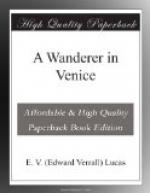Here is one of Byron’s rattling descriptions of a Venetian night. The date is December 27, 1816, and it is written to his publisher, Murray: “As the news of Venice must be very interesting to you, I will regale you with it. Yesterday being the feast of St. Stephen, every mouth was put in motion. There was nothing but fiddling and playing on the virginals, and all kinds of conceits and divertisements, on every canal of this aquatic city.
“I dined with the Countess Albrizzi and a Paduan and Venetian party, and afterwards went to the opera, at the Fenice theatre (which opens for the Carnival on that day)—the finest, by the way, I have ever seen; it beats our theatres hollow in beauty and scenery, and those of Milan and Brescia bow before it. The opera and its Syrens were much like all other operas and women, but the subject of the said opera was something edifying; it turned—the plot and conduct thereof—upon a fact narrated by Livy of a hundred and fifty married ladies having poisoned a hundred and fifty husbands in the good old times. The bachelors of Rome believed this extraordinary mortality to be merely the common effect of matrimony or a pestilence; but the surviving Benedicts, being all seized with the cholic, examined into the matter, and found that their possets had been drugged; the consequence of which was much scandal and several suits at law.
“This is really and truly the subject of the Musical piece at the Fenice; and you can’t conceive what pretty things are sung and recitativoed about the horreda straga. The conclusion was a lady’s head about to be chopped off by a Lictor, but (I am sorry to say) he left it on, and she got up and sang a trio with the two Consuls, the Senate in the background being chorus.
“The ballet was distinguished by nothing remarkable, except that the principal she-dancer went into convulsions because she was not applauded on her first appearance; and the manager came forward to ask if there was ‘ever a physician in the theatre’. There was a Greek one in my box, whom I wished very much to volunteer his services, being sure that in this case these would have been the last convulsions which would have troubled the Ballerina; but he would not.
“The crowd was enormous; and in coming out, having a lady under my arm, I was obliged in making way, almost to ’beat a Venetian and traduce the state,’ being compelled to regale a person with an English punch in the guts which sent him as far back as the squeeze and the passage would admit. He did not ask for another; but with great signs of disapprobation and dismay, appealed to his compatriots, who laughed at him.”
Byron’s first intention was to write nothing in Venice; but fortunately the idea of Beppo came to him, and that masterpiece of gay recklessness and high-spirited imprudence sprang into life. The desk at which he wrote is still preserved in the Palazzo Mocenigo. From Beppo I quote elsewhere some stanzas relating to Giorgione; and here are two which bear upon the “hansom of Venice,” written when that vehicle was as fresh to Byron as it is to some of us:—




